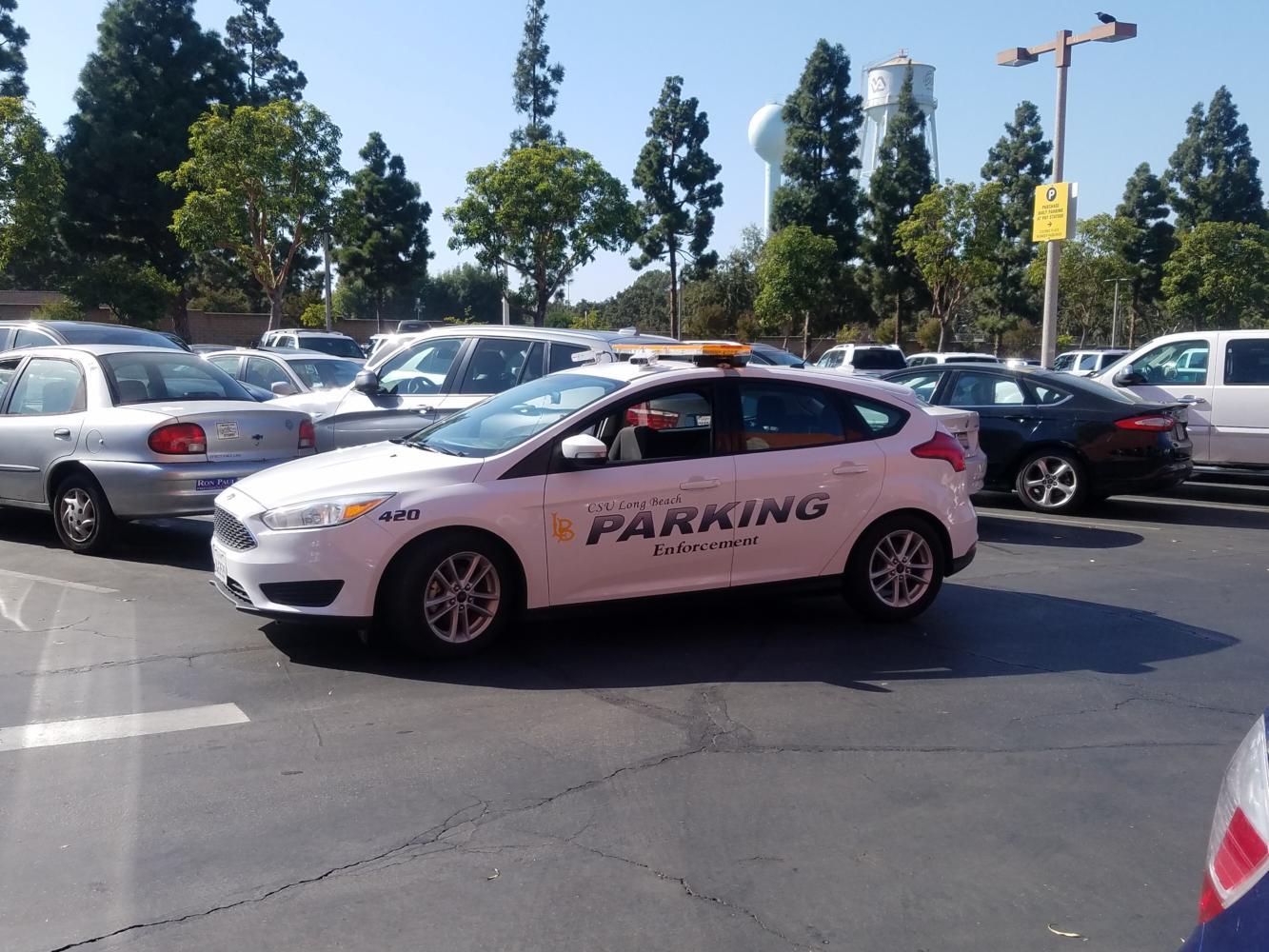Unanticipated citations due to the new license plate recognition system implemented on campus this semester are frustrating numerous faculty over time spent contesting the parking violations.
In an email sent out to campus faculty, Elizabeth Dahab, a comparative world literature and classics professor at Cal State Long Beach, described her outrage after having to contest several parking citations.
“The ordeal cost me on and off hours of fool’s errands and undue stress, “ Dahab said.
The new paperless parking system replaced the use of physical permits with a “virtual permit” linked to one’s license plate. In order to identify who has paid their parking fees, tiny cameras mounted on parking enforcement vehicles capture an image of a license plate where the image is then automatically cross-referenced against the campus parking database.
The LPR system has expedited parking enforcement and eradicated prior issues of ticketing from parking permits being stolen, forgotten, dropped from the windshield or misplaced, according to the Parking and Transportation FAQ website.
The number of complaints received by the department is very small compared to all the students and faculty registered in the parking database, said Robyn Ames-Woodyard, CSULB’s director of operations financial management, who holds the Parking and Transportation Department under her purview.
“Our research has indicated that the referenced ticketing was not associated with system malfunctions, but are most commonly related to user input errors,” Ames-Woodyard said in an email.
As the focus shifted to the license plates, so too have the reasons for ticketing.
“Examples of the most common input errors that may lead to a citation from the parking system include incorrect license plate information, replacement of a Vehicle Identification Number on a new car when the corresponding license plate is received or the use of an alternate vehicle not previously registered in our system,” Ames-Woodyard said.
Without physical permits, technical malfunctions that occur on behalf of the new system’s technology doesn’t protect students or faculty from finding the $50+ ticket tucked under their windshield wiper.
Dahab’s debacle appears to be the product of a technical error, not a personal one. She had bought her virtual permit online before beginning the fall 2017 semester. Her portal indicated that her information was complete, accurate and her payment was processed. Fall semester began and suddenly tickets began to appear on her dashboard.
“I went again online to see if everything was fine; and on my end everything was fine. I didn’t know what to do. I went to the police station and contested the tickets,” Dahab said.
The assumption of the University Police Department was that she had made a mistake while entering her license plate number online. Dahab said she insisted otherwise and was surprised by the response she received.
“He [the UPD officer] actually kind of yelled a little bit. He dismissed it and he voided the ticket, but he was quite aggressive. He was sure that I made a mistake,” said Dahab. “Then I went to Brotman Hall, and they discovered at the cashier’s window that it [her account information] was not linked. It was a mistake on their end.”
Andrew Jenks, an associate history professor at CSULB, relied on the physical permits to remind him of when his parking would expire because the dates were printed on the square adhesives. In Jenk’s mind, strong communication between administration, faculty and students has never been a campus priority. In June, he and a number of other faculty were ticketed for not having updated their parking permits, which had transitioned for faculty to the LPR system in the summer. Jenks said administration did not properly warn him, or others.
“So I complained about it,” Jenks said. “I said it’s unfair, you’re setting up people to get parking tickets when you change the system and you don’t tell people the system is changed.”
Although their tickets were eventually rescinded, Jenks said the trouble it caused was enough to make he and other faculty question CSULB’s motives toward changing the system.
“This is typical of the university. Whenever they do something new they always present it as advancing into the 22nd century and automating this that and another thing and making it ‘easier’ for people’s lives,” Jenks said. “But ultimately in the transition, a whole bunch of things they didn’t think about start to happen and that creates a headache for people.”
CSULB is the first state college to adopt the new procedure but isn’t the only campus in the U.S. to utilize virtual parking. Colorado State University has administered their “virtual permit enforcement” with their students and faculty.
Ames-Woodyard said she realizes that there are hiccups that can occur in transitioning to a new system and the parking department has taken some steps to address the issues they found to be most problematic like common user input errors.
“We…offer input assistance to individuals at various locations on campus and have developed a citation appeal process to mitigate these issues,” Ames-Woodyard said.
Paraphrasing the words of UC Berkeley’s first chancellor Clark Kerr, Jenks retells the major concerns for the three main groups on campus.
“The alumni care about sports, the students care about sex, and the faculty care about parking,” Jenks said.




